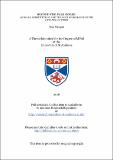Beyond the pale horse : animals, substitution, and the cost of romance in the 'Orlando furioso'
View/
Date
26/06/2018Author
Supervisor
Metadata
Show full item recordAltmetrics Handle Statistics
Altmetrics DOI Statistics
Abstract
This study responds to Patricia Parker's landmark account of endlessly expansive romance, suggesting that the genre's structural deferrals and excesses come at a steep hidden price. Like other early modern discourses—rhetoric, economics, empiricism—romance produces a fiction of unmitigated progress which assiduously obscures losses sustained along the way.
Ludovico Ariosto's ‘Orlando furioso’ is distinct from later romance epics because it refuses to conceal its own logic, instead staging scenes of cost openly and conspicuously. I suggest that the
brutal subroutines sustaining romance's narrative profusion are visible in the poem's
exceptionally strange and vital animal figures, which deviate sharply from more conventional
images deployed by Ariosto's successors. The first chapter considers the figure of the mother
predator, whose irate defense of her abducted offspring serves to augment the wrath of the
Furioso's male paladins. These indecorous comparisons destabilize the poem's justifications for
violence; by contrast, similar figures in Edmund Spenser's ‘The Faerie Queene’ and Torquato
Tasso's ‘Gerusalemme liberata’ reinforce normative hierarchies and place romance's violence
beyond question. The second chapter addresses Orlando's savage killing of a female packhorse
while in the nadir of his madness. With reference to the poem's other scenes of sexualized
violence, I respond to readings that situate Ariosto's mare as a symbol of humanist dialectic
advancement, suggesting that the mare's adamant suffering instead exposes the costs exacted by
that romance of progress, a disclosure which disappears in the later poems. The stakes of this
project are urgent: by attending to the ways in which romance linchpins arme and amori are
mapped onto women and female animals, it is possible to trace how sexual violence was
understood by a poem with a broad and enduring legacy, and to approach its disclosures as a
radical act.
Type
Thesis, MPhil Master of Philosophy
Collections
Items in the St Andrews Research Repository are protected by copyright, with all rights reserved, unless otherwise indicated.

